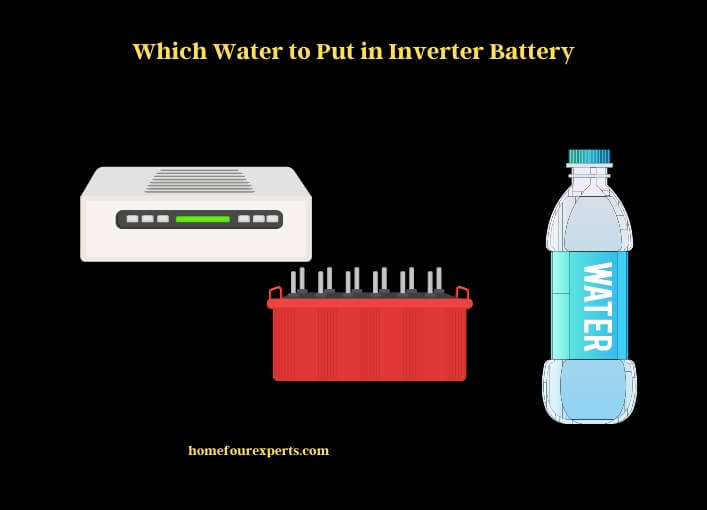Which water to put in inverter battery? Can you use bottled water for diluting battery acid? Can you use regular tap water?
You should use distilled water for an inverter battery. Distilled water is a sort of purified water that does not have minerals or ions in it. It is also free from other impurities. Therefore, distilled water is suitable for inverter battery use.

But what if it is not accessible for you at the moment? What should you do then? Keep reading as we have suggestions for you below for those types of situations. If you are a battery enthusiast or inverter owner, you must know which water to put in a battery.
Which Water to Put in an Inverter Battery?
When it comes to putting water into your inverter battery, you have to be very distinctive. You can not put any water in batteries. A battery needs water that is free from impurities, dust particles, and heavy metal pollution. In today’s case, water is vastly polluted.
You can barely get fresh water with balanced pH unless it is processed in the water plants. But that is not usable in an inverter battery. So, which water should you use in a battery then?
Frankly speaking, you have two options here. You can either go with-
i) Distilled water, or
ii) Deionized water
Distilled Water
Distillation is a process of purifying water where you boil the water, and the vapor is then collected into another container and turned back into the water when it cools down. In this process, the distilled water does not contain any impurities from the original water.
Thus all the heavy metals are separated from it. This water is safe to drink, and this purified water is usable in inverter batteries now.
Deionized Water
Deionized water is also called demineralized water since all the mineral ions have been removed through the process. In the deionization process, a chemical substance is used to purify the water. Deionization is a much quicker process than distillation, and the result is almost similar.
There is no residue left after the process, and the water is free of impurities. However, the water is still not safe to drink since the organisms are not targeted and removed during the procedure.
Why Use Distilled Water for Inverter Battery?
When your battery needs water, you can not put plain tap water in it. You need to use distilled water. There are some significant reasons for using purified distilled water in batteries. And the reason is not that your battery will get sick. What do you think, what is the reason? Here is the main cause to fill your inverter battery with distilled water-
When the acid in your battery condenses, it requires a liquid substance to get back in a functional state, or the battery will die. You need to use water that does not have dust, dirt, minerals, or metal particles dissolved in it. Drinking water or filtered water is not usable here.
The water we drink has ions in it. If we use it in an inverter, it will resist the electrodes from working. The ions from the water build a layer on the plates over time. Thus it prevents the battery from generating electricity. That is why distilled water is preferred all over the world for use in inverter batteries to maintain the functionality of the battery.
Does ‘Bad’ Distilled Water Kill Your Inverter Battery?
Distilled water does not have an expiry date. It does not go bad unless left in a contaminable state. If the water is kept safely with a properly closed lid, it is still usable even if the date is expired. You only have to make sure that there are no dust particles inside it so the water will not kill your inverter battery.
When to Fill Up an Inverter Battery With Water?
You need to know how much water to fill up in an inverter battery. Every battery has a water level indicator on it. When the water dries up in your inverter battery or remains below the indicated level, you need to fill it up to the mark.
You should check on the battery every one or two weeks, depending on the frequency of use. If the battery has several compartments, check each of them for a water refill. You can use cell phone reminders for a regular refill.
FAQs
1. Why Use Distilled Water for Inverter Battery?
Distilled water does not have concentrated minerals which is a crucial factor for diluting the acid in a battery. Mineral elements can disrupt the normal function of a battery and reduce the battery life. While distilled water does not have mineral components, it also has the right pH balance for electron flow inside the battery. So, distilled water is the best option for your inverter battery.
2. Which Water Is Suitable for Battery?
For batteries, you should use distilled water. Distilled water contains no minerals, and it is the most used water for batteries. Also, deionized water can be used for batteries. However, do not use boiled or plain tap water for your inverter or car battery. That will lessen the performance and reduce the lifespan of the battery.
3. Can We Use Boiled Water in an Inverter Battery?
Boiling the water may kill the microorganisms, but it does not remove any minerals from the water. Moreover, the water hardens; that is, the mineral component in the water concentrates when you boil. If your battery has a really low water level, you can use deionized water or water from a reverse osmosis water filter if distilled water is not available at the moment.
Using tap water rather than boiled water is better to prevent instant battery failure. It will shorten the lifespan, but boiling the water will only worsen the situation. But you should not use boiled water in an inverter battery in general.
4. Can We Use Ro Water in Inverter Battery?
Reverse Osmosis or RO is a process of water purification where water is purified using advanced technology to remove impurities which is a completely different process than distillation.
We recommend using distilled water since heavy metals may not be completely removed by the reverse osmosis process. You should not use RO water in inverter batteries.
The water to be used in batteries must maintain the hardness, pH, and TDS (Total Dissolved Solids) limit. The water to be used in batteries should be demineralized, and the pH level must be between 5 and 7.
Conclusion
Which water to put in inverter battery? You better choose between distilled water and deionized water. However, we would suggest using distilled water. It is the widely used version of water for batteries. Also, it does not cause any harm to the battery’s functionality.
But if distilled water is not accessible at the moment and your battery is in dire need of water, you can use demineralized water. Tap water is not ideal for batteries. It builds up elements on the battery plates and prevents the free flow of electrodes.
Read more:
About This Writer

Hi, I am responsible for the 'Homeowners Power Solutions' category. My name is Liam Jaxon and a licensed technician with 7 years of experience in vehicle batteries, electrical gadgets, and home appliances. My working experience in different residential & light commercial electrical sectors and the automobile industry helped to acquire vast knowledge in this industry.